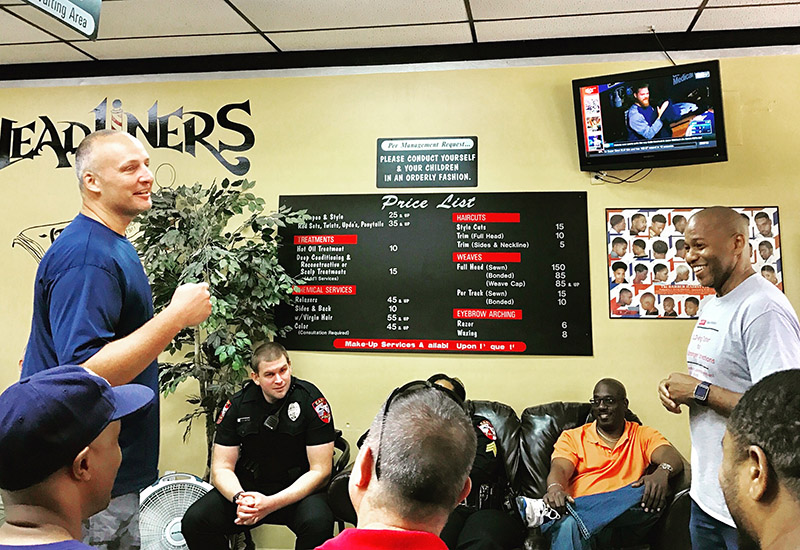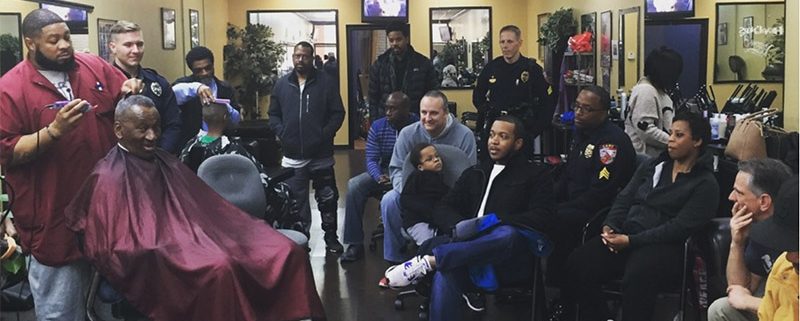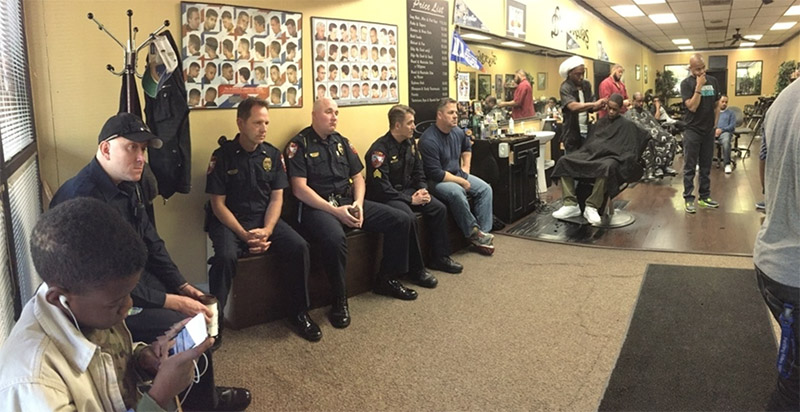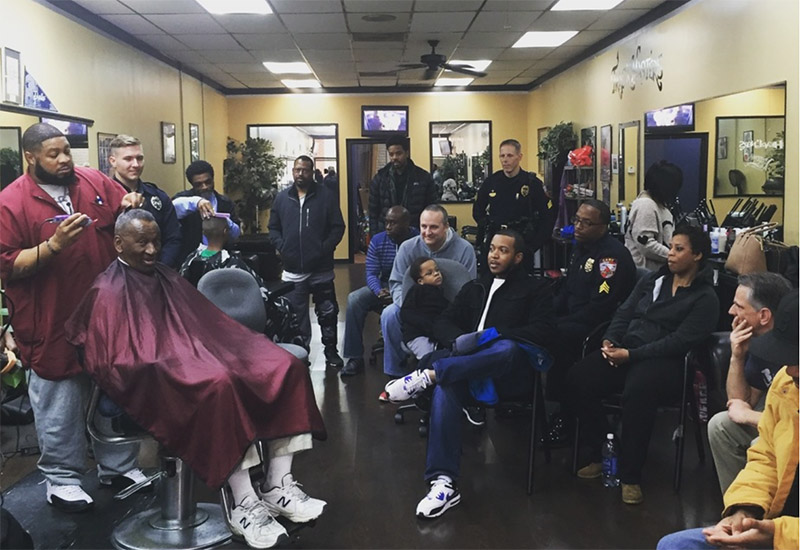Police-Community Conversations Reflect on Five Years Since Ferguson
Cary, NC – For the past five years, Headliners barbershop has been hosting conservations between Cary police officers and members of the African-American community to improve relations. These talks coincide with the events in Ferguson, Missouri in 2014, and this weekend, the discussions at the barbershop will center around Ferguson and what has happened in the five years since, with Ferguson’s new police chief sitting in.
Five Years After Ferguson
For many years now, Headliners on Ryan Road in Cary Village Square has been part of the Cary Police Department’s Building Bridges program, which started as a way to connect the police department with the African-American community through local churches.
“We’d done some soul-searching in the department – an internal assessment of our connections to our minority populations,” said former Cary Police Chief Tony Godwin. “That first night of Building Bridges, we asked what the perception of the department is. We thought it would be okay. There had been no major incidents. But instead what we heard was, the police protect the white community and police the black community.”
Godwin said the department had a decision to make: get indignant or do something about it. But around this same time, in August 2014, when Michael Brown, an unarmed black 18-year-old, was shot and killed by Darren Wilson, a 28-year-old white police officer, in Ferguson, Missouri. This sparked not only protests in Ferguson but broader protests and discussions about the police in the United States, including here in Cary.
“When things like that happen, the fact that it was thousands of miles away is irrelevant. People react to us as if it was our own town,” Godwin said. “The fact is, as police, you represent something larger than yourself and larger than your department. You reflect the entire profession.”
The events in Ferguson also drove Tru Pettigrew to meet with the Cary Police Department and talk with them about the relationship between African-Americans and the police. Pettigrew was unavailable for this interview.
“My fear was, as a young black man growing up in Cary, it could happen to him too,” Pettigrew said back in 2017. “I didn’t want him to be the next hashtag.”

Lieutenant Jeremy Burgin on the left and Tru Pettigrew on the right, with Cary police and community members at Headliners
Since then, Pettigrew has worked with the department to create more community outreach and education programs, as well as set up the monthly “barbershop rap sessions” at Headliners.
“Hearing from Tru, he added extra guidance and we invited him to get involved,” Godwin said. “Tru has become one of my best friends on Earth.”
Normally, these sessions take place on the first Saturday of the month but this November’s was moved to Saturday, November 9, 2019 to line up with the schedule of Ferguson’s new police chief Jason Armstrong, who is in the area for North Carolina Central University’s homecoming, where Armstrong graduated. This rap session will be about Ferguson specifically and the impact it’s had five years later on the United States.
“We’re fortunate to have Jason come and talk with us about where Ferguson is now and look at what his vision is,” Godwin said.
Godwin and Pettigrew got in touch with Armstrong after he came to their presentation on Building Bridges and their other outreach programs COHORT and COHEART at the International Association of Chiefs of Police conference in Philadelphia.
“Tru and I have seen amazing things in this community and not just in Cary,” Godwin said, with rap sessions now across the Triangle and North Carolina. “It’s growing and spreading. I’ve seen hearts changed, relationships built, people who wouldn’t have been caught dead being with law enforcement coming and getting to know us. Building Bridges made all the difference. I believe lives have been saved because of these connections.”
A Different Approach
When the events in Ferguson took place, Godwin said it was a powder keg, but in the department, himself and other Cary police officers talked about the opportunities it created here in town.
“We wanted to see it as an opportunity to show people their perception of us is not who we are. We have reactions like everyone else. Police are not robots or automatons. We have a multitude of thoughts and reactions,” he said. “The toughest part of my career was the last five years, from Ferguson on. But also, it was the best five years because it shows we can make a difference.”
Godwin said these past years’ discussions have changed how the department thinks about potential problems, by considering how to react before they start. For example, when the NWA biopic “Straight Outta Compton” came out in 2015, Godwin said they thought about how some people may use the film’s music to intentionally provoke local police and they talked about it on the front end to make sure they wouldn’t “give into emotions” as he put it.
“I wouldn’t have thought about it before. It would have just been another movie,” he said. “Now, we’re considering things before they become problems.”
Over the past five years’ discussions and talks and programs, Godwin said policies were reviewed and the department is now deliberate about hiring people – from officers to clerks and everything in between – to understand these issues and their importance to the department.
“We wanted people with the right heart, the right understanding and put that into the hiring process,” he said. “It’s not just about the technical skills. We want the technical skills, but we also want these other skills to fit into the new culture that we’re creating.”
Godwin said this also affected his approach to the 2017 case where a young man, Shaquian Johnson, was shot and killed in the course of a burglary by Cary police officer AJ Lopez after Lopez said Johnson shot at him. In his press conference, Godwin said he made sure to refer to Johnson by name and to talk about the impact this had on Johnson’s family, as well as the impact on Lopez and the victims in the burglary.
“When you call someone a defendant or a suspect, it feels dehumanizing. Whether you agree or not is irrelevant. What matters is the impact,” he said. “[Johnson] did things he shouldn’t have done and he paid the ultimate price, but he still had value. He was still a 23-year-old man.”
The barbershop rap session is on Saturday, November 9, 2019 from 8 to 10 AM, and it is free and open to the public at Headliners at 1028 Ryan Rd.
Story by Michael Papich. Photos courtesy of COHORT and COHEART.





